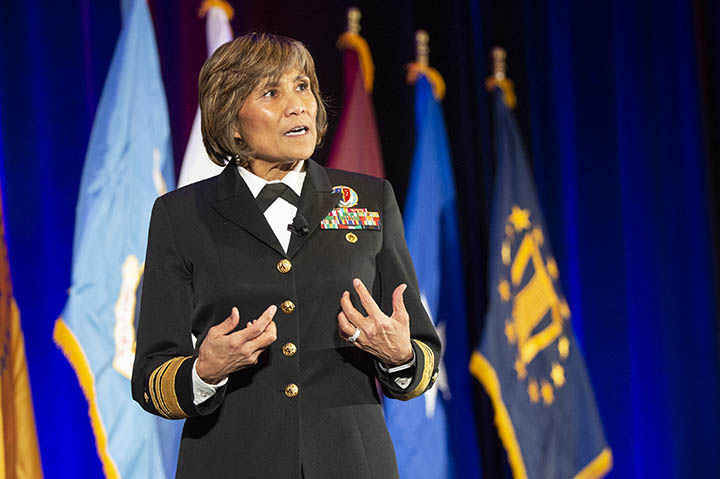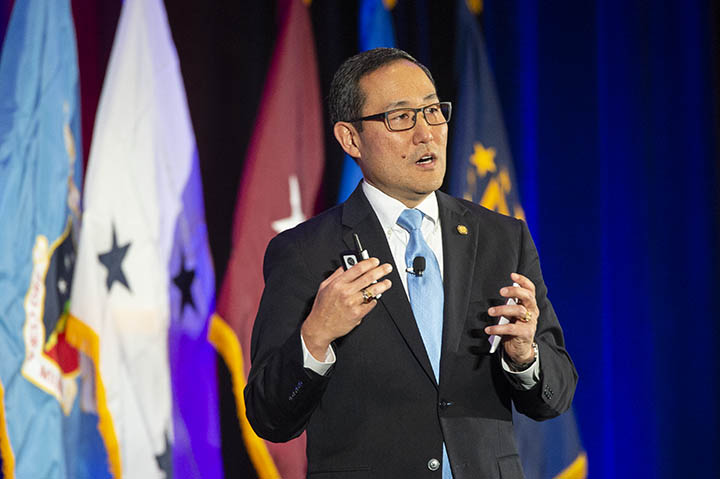
DHA leaders: Embrace historical changes to military health

Vice Adm. Bono, director of the Defense Health Agency (DHA), delivers remarks at the AMSUS 2018 DHA general session. (MHS photo)
Transforming the Military Health System into an integrated system of readiness and health was the topic for two Defense Health Agency leaders on Wednesday, Nov. 28, during the 2018 meeting of AMSUS, the Society of Federal Health Professionals.
“We have an incredible, incredible health care system,” said Navy Vice Adm. Raquel Bono, director of the DHA, “and we have the capability to be so much better. It’s our mission to make our health care system the very, very best that our patients deserve and need.”
Under the backdrop of the 127th AMSUS annual meeting theme, “The Future of Healthcare is Now,” Bono described planning for changes that are occurring as the DHA assumes administrative and management responsibilities for all military treatment facilities. Several MTFs came under the DHA umbrella on Oct. 1, the first step in a phased approach for DHA to gradually assume direct management of all MTFs by Oct. 1, 2021.

Mr. Guy Kiyokawa, deputy director of the Defense Health Agency (DHA), delivers remarks during the AMSUS 2018 DHA general session.
Bono noted that this organizational change was required by Section 702 of the National Defense Authorization Act for Fiscal Year 2017. MTFs will adhere to DHA policies, procedures, and standard clinical and business processes that have been developed jointly by DHA and military department medical leaders.
Bono said there’s a “hand-in-glove fit” between readiness and health care delivery. Transforming the MHS ensures better care and better health at decreased costs, she said, and with improved readiness at the center of all efforts. Anything that might negatively impact quality and safety, Bono added, is “completely non-negotiable.”
Bono urged the conference attendees to become involved with changes that are occurring. “You have the expertise and the knowledge to move the MHS to the next level,” she said. “You know what the system is capable of and what’s needed to get it to the enterprise level.”
She also noted the positive aspects of the NDAA requirement. “It’s transformative; it’s historical,” she said. “And you get to be a part of it.”
Guy Kiyokawa, deputy director of the DHA, also addressed attendees at the session. He noted that integration means “changing the way we do business, and standardizing where it makes sense.”
He said the MHS transformation means policies and practices will be standardized across the system, reporting relationships will change, and the organizational focus will be on a market orientation.
However, Kiyokawa emphasized, two aspects will not change: support of the military mission and patient-centered care.
“The DHA is a combat support agency,” he noted, “and an integrated system of readiness and health means something.”
Combat support is an agency-wide responsibility, he added, and DHA is responsible and accountable to the services to deliver ready medical forces.
Kiyokawa also said MHS GENESIS, DoD’s new electronic health record, will be a key tool in standardizing. “It’s a big challenge” to implement it, he said.
Kiyokawa also said DHA leadership acknowledges what it’s heard from conference attendees: to accelerate value over workload, partner with federal and civilian colleagues, focus on health and not just health care, and articulate a leadership pathway.
AMSUS continues through Friday, Nov. 30, in National Harbor, Maryland.





















.png)









No hay comentarios:
Publicar un comentario